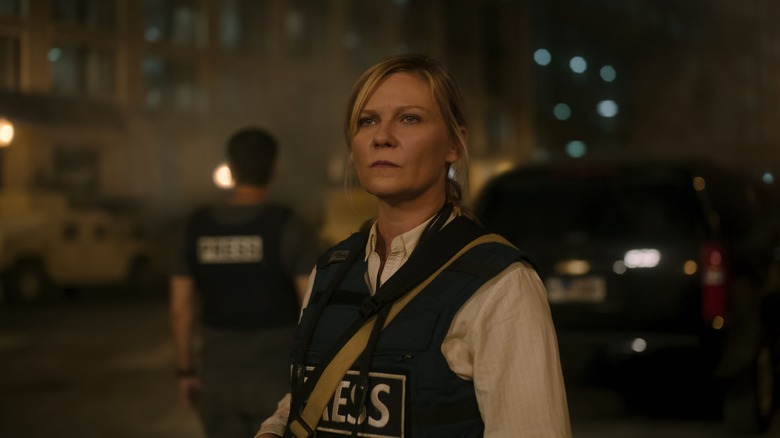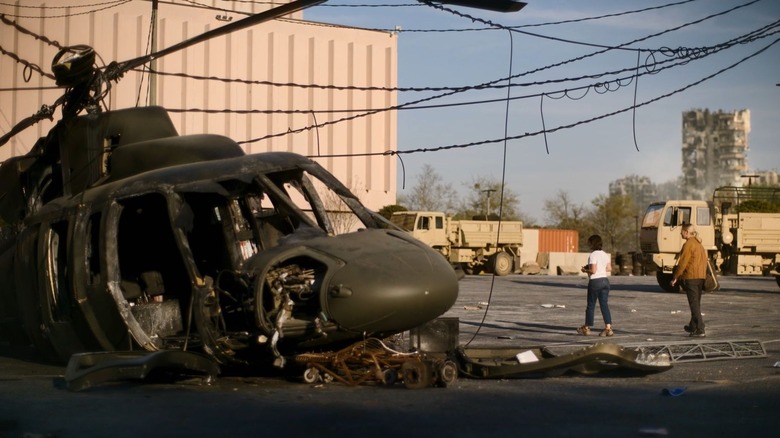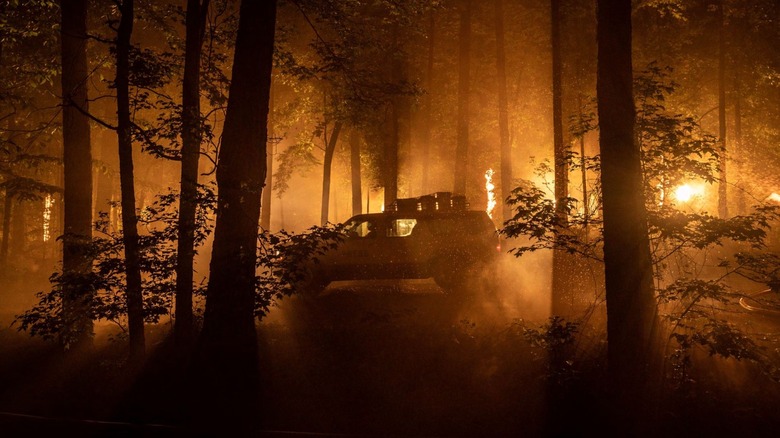The Politics Of Alex Garland's Civil War Need An Analysis Of Their Own
Warning: This article discusses major spoilers for "Civil War."
At no point in Alex Garland's "Civil War" (reviewed by /Film's Jacob Hall here) do we ever find out what actually triggered the nationwide descent into chaos and violence raging throughout the movie. The action begins with Nick Offerman's unnamed President of the United States quietly reciting a prepared statement to himself, struggling to find the perfect cadence and tone for a speech that, as we eventually learn, serves as a desperate last gasp from the losing side's propaganda machine. The film ends with rebel soldiers standing triumphantly over that same President, now deposed, and celebrating over his still-warm corpse like countless wartime images beamed back from abroad to so-called First World countries — all of whom would contend they'd never commit such savagery. In between, we follow our journalist protagonists Lee (Kirsten Dunst), Joel (Wagner Moura), Sammy (Stephen McKinley Henderson), and Jessie (Cailee Spaeny) acting as neutral observers who are nonetheless caught up in the conflict at practically every turn. And, still, not once are the actual politics of this inherently political-minded feature ever discussed.
Is this a failure of imagination, a capitulation to "both sides" rhetoric, or something else altogether? While "Civil War" itself may keep things purposefully vague and opaque, the discourse swirling around the film (even long before its release) has been anything but. On one side, there are those who would accuse the picture of endorsing what it depicts. On the other, frustrations mount that "Civil War" refuses to actually spell out how we're meant to feel about the visceral imagery on display. Both seem united by the idea that, in the absence of didactic moralizing, the blame lies with the author.
However, perhaps things aren't nearly as simple or as shallow as they might seem.
When 'apolitical' is the point
Only the most naïve and shortsighted of filmmakers could've presumed that the premise of a modern civil war in America would somehow avoid stirring up uncomfortable and polarizing conversations. Hopefully, most would agree that such a broad accusation couldn't reasonably be leveled towards the artist behind complex, challenging movies like "Sunshine," "Ex Machina," and "Annihilation." If we take Alex Garland's (arguably) apolitical stance as an intentional choice — a bare-minimum benefit of the doubt that we ought to grant to most, if not all, works of art we engage with in good faith — then the next step requires investigating why and whether the results match the execution.
Take it directly from Garland himself. In an interview with /Film's Jacob Hall, the director spoke about his aims in telling this story the way he did and how his ambitions reflect the journalistic point of view at the center of the film:
"The film attempts to function like old-fashioned reporters and, in a way, what old-fashioned reporters would do. Not that they don't exist anymore, they do, it's just they exist surrounded by this noise, which diminishes their traction. What they would do is, in a sense, say, 'This is what I observed.' Then, it would be up to the reader in the old days or the viewer to take their own meaning from that."
Dismissing this approach might carry more weight if the nature of subjectivity versus objectivity weren't baked right into the work of photojournalists — and, by extension, the entire film. Constantly, the editing in "Civil War" cuts to still photos of carnage and killing taken by various characters, daring us to separate ourselves from the horror on screen. It's telling, then, that this is precisely how Jessie captures Lee's haunting death.
Questions without answers
What is it about abstraction and ambiguity that tends to unsettle us so much? The divisive response to "Civil War" can't help but feel strikingly similar to certain readings of Christopher Nolan's "Oppenheimer" last year or even the (over)reaction to Todd Phillips' "Joker" in 2019 – two films that, regardless of one's opinions on their respective merits (or lack thereof), steered away from conventional thinking and audience expectations. Garland's war film has drawn both praise and criticism for its provocative subject matter but, fittingly enough, well-written arguments have come from all corners. (Justin Chang of The New Yorker recently published one, as did Vulture's Bilge Ebiri.) The debate rages on.
Throughout almost every scene of this road trip movie from hell, Garland walks an impossibly fine line. Deep down at its core, the most controversial aspect of this A24 blockbuster is its refusal to plant its flag behind nationalistic screeds and ideologies. Instead, "Civil War" takes a much more zoomed-in perspective, emphasizing individuals encountered on the road in order to paint a bloody portrait of how concepts like "the cause" get tossed right out the window once the bullets start flying. In one particularly harrowing moment, our quartet of characters encounter a rogue sniper taking potshots from a distant building. When Joel scrambles up to a pair of soldiers under fire to ask who they fight for and why their unseen threat is doing this, their (paraphrased) response says it all: Someone's trying to kill us, and we're trying to kill them.
On their deadly drive to DC to secure an interview with the President, our main characters spend the entire film searching for answers ... before failing to get any. Maybe that's the key takeaway for us viewers, too.
"Civil War" is currently playing in theaters.


